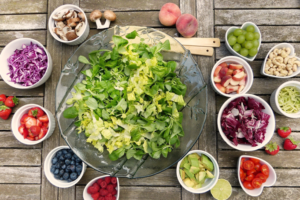By Pat Kendall, Ph.D., R.D.
In today’s fast-paced, high-stress world, it can be difficult to practice healthy eating and activity habits, whether at work, school, home or on-the-go. Taking time to incorporate healthy eating and activity habits into your daily routine can make a big difference in your energy and stress levels, performance at work or school, and overall health and quality of life.
March is National Nutrition Month and a good time to celebrate healthy living by practicing simple tips for eating smart and moving more:
Start your day with breakfast. A balanced breakfast is important because it helps to replenish blood sugar stores that were used up during an overnight fast. These stores are critical in helping to energize your day’s mental and physical work. Breakfast also helps stave off midmorning hunger, which can affect your ability to concentrate.
Need to make a phone call? Use this time to stand up, walk, or at least stretch various muscles. Tilting your head from side to side and front to back as you talk is a good way to help relieve tension in your shoulders and neck.
Take time for a lunch break, even when you’re under pressure. Eating lunch can help you avoid a dip in your afternoon energy level. When possible, follow up your lunch break with a brisk walk.
Enjoy lunch with fellow students, colleagues, office staff or friends. There are many health benefits to ‘eating together’.
When you are out to lunch, stick to water, low-fat milk or unsweetened tea as your beverage of choice. Alcohol and sugary beverages provide empty calories and can make you feel drowsy.
Got mid-afternoon cravings? Ask yourself if you’re really hungry or just stressed or bored. If you’re not hungry, taking a quick walk around the block or up and down the stairs can help clear your mind. For those times when you’re really hungry, keep a stash of nutritious snacks in your desk drawer, cooler bag or workplace fridge. Consider baby carrots, apples, bananas, oranges, trail mix, low-fat yogurt and peanut butter. Try to avoid mindless munching while reading or working on your computer.
What about office celebrations? Participate and enjoy just a small piece of cake. When it’s your turn to bring goodies, bring a beautiful fruit tray with yogurt dip.
Before a busy week, make a meal plan and stock your kitchen with ready-to-eat staples that you can use to make quick nutritious meals and snacks, including canned beans, hard-boiled eggs, old fashioned oats, whole wheat bread or tortillas, pre-washed salad kits, frozen vegetables, yogurt or canned fish.
Make time to move. Schedule movement breaks into your day like any other important activity (walk the dog, walk down the street to pick up the mail, or take 20 minutes to work out on a treadmill or stationary bike). Movement breaks can improve focus and decrease stress, which can be effective for preventing stress eating.



































































































